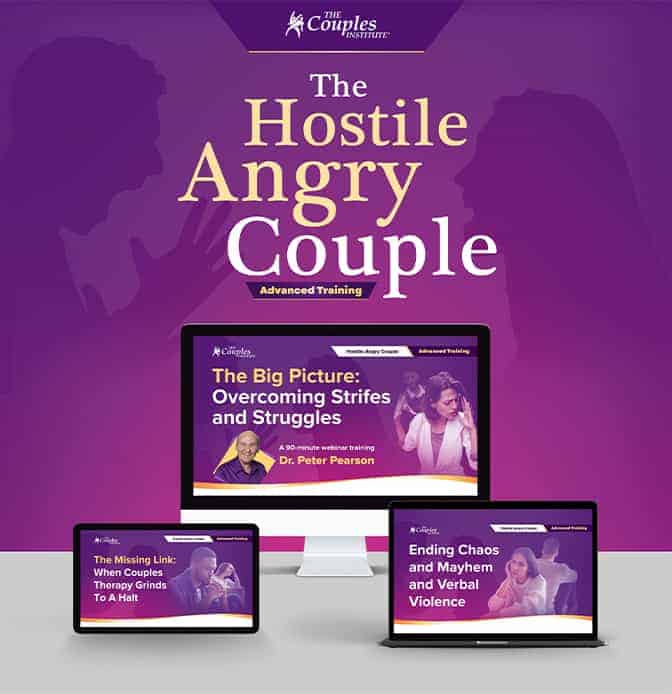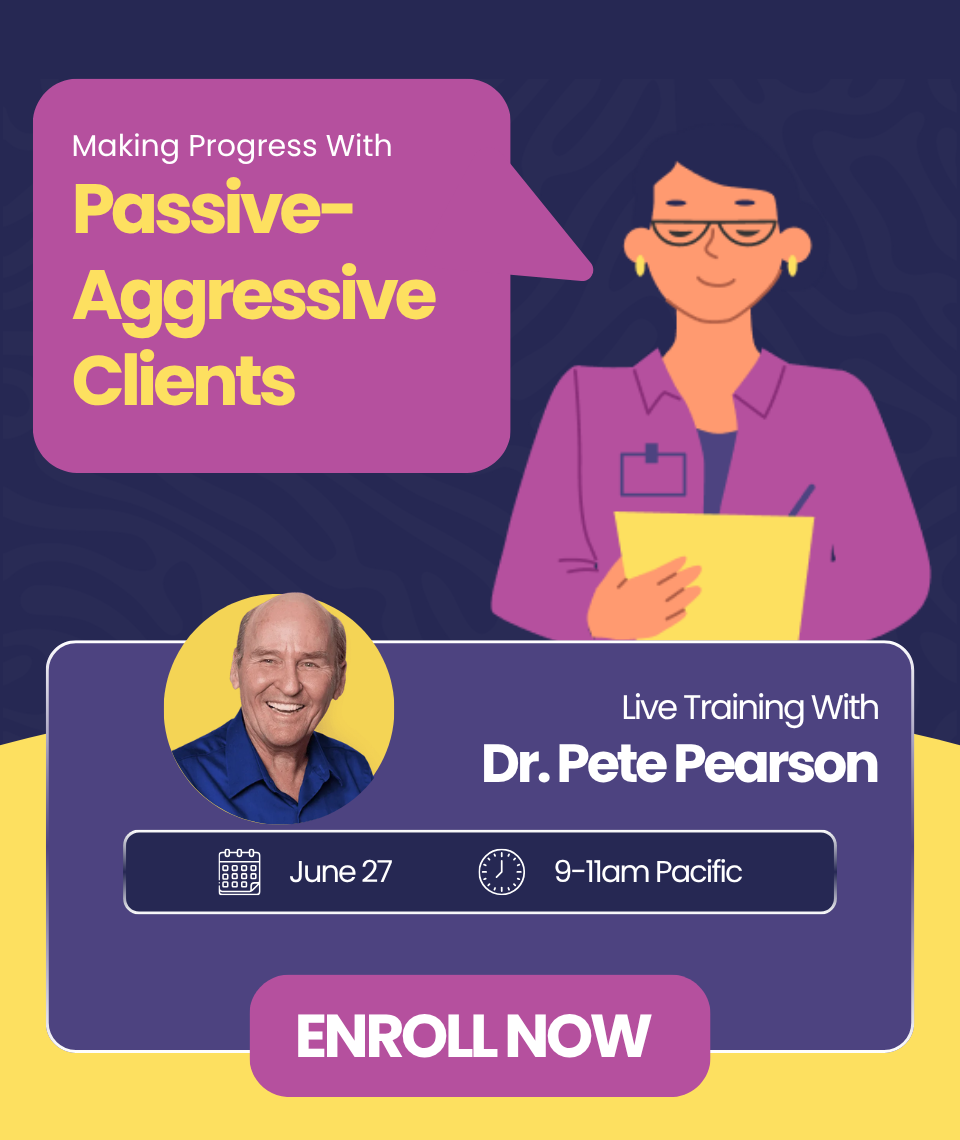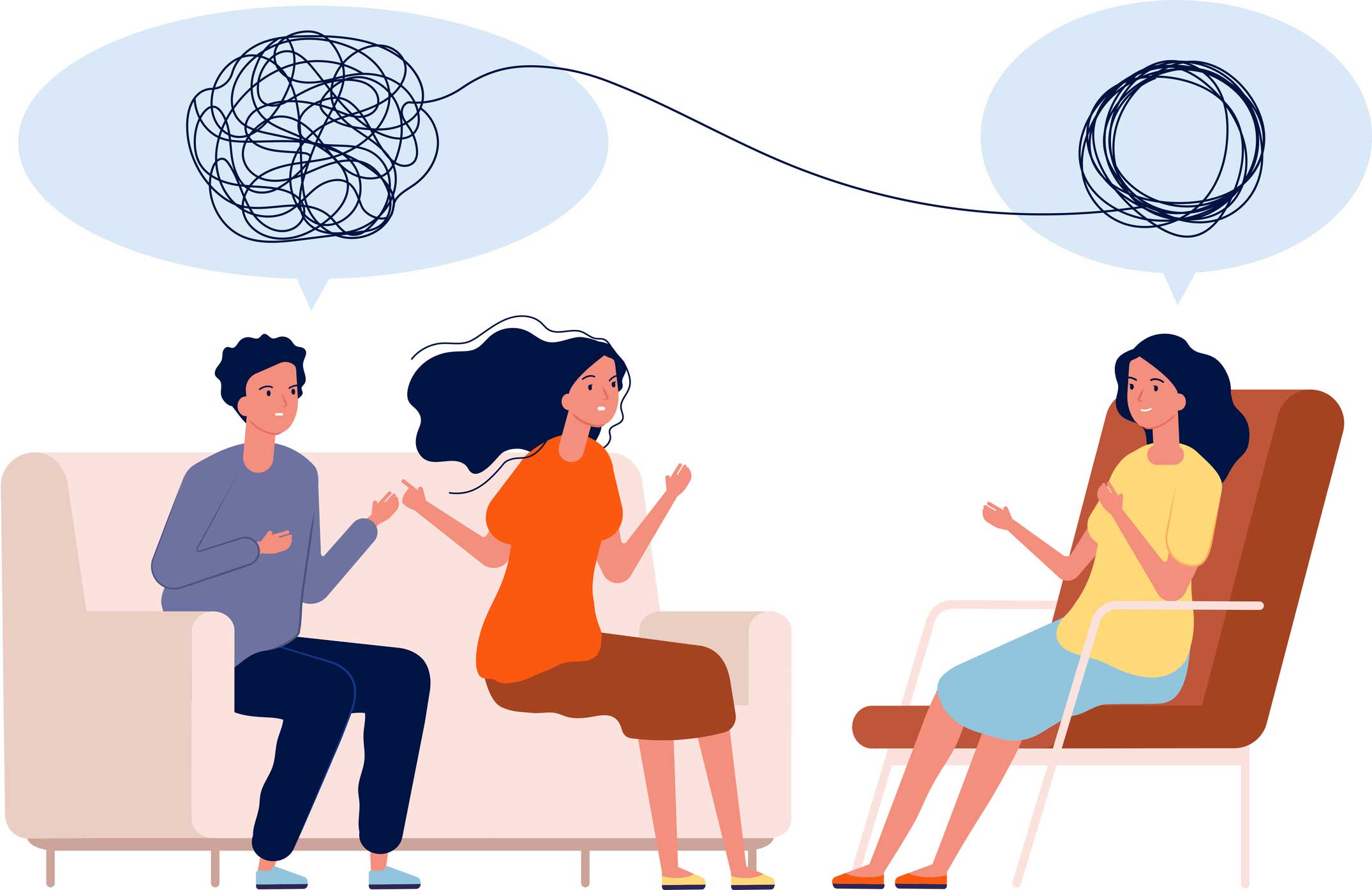A couple that’s been together for fifty-plus years with a history of alcoholism, violence, and codependency walks into your office…
No, this isn’t the beginning of a joke. It’s a common scenario, but there are few therapists around the world that really know how to work well with couples like this. Unless the couple is just looking to calm the situation down and put a band-aid over the top, you can be sure your work will be both intricate and tough. It will take a lot of time and sustained effort to achieve long-term change with this type of couple, so the first thing you want to ask yourself is: Do I have the time and the bandwidth in my own life to take on a couple like this?
It’s important to know what your expectations of yourself are, and then to have alignment between you and the couple about where you're going. Knowing how much work is going to actually happen is essential to everyone’s success.
But now they’re sitting in your office…. What do you do?
Ask yourself these five essential questions to guide your work in sessions with a long-term very stuck couple.
- Who is in charge of the therapy and this very session right now?
- Do you know where you are leading them?
- What steps will create lasting change?
- What developmental capacities are lacking in each partner that make them so reactive and so easily triggered?
- Are you clear that empathy and insight will not be sufficient to change a couple like this?
Why are these questions important?
If you, as the therapist, don't know the answers, you will not be in control. One or both clients will end up leading the session where they think it should go, whom it should focus on, why they, themselves are not at fault for the current situation, and/or cannot self-reflect on their part in their issues. All of this renders the sessions ineffectual and the expectations of the clients as well as yours, the therapist, unattainable.
When you have a long-term symbiotic couple, it’s very difficult to get each person back in their own skin. Being back in their own skin means being accountable for their own behavior, being responsible for their own change. It also means having some motivation and willingness to change themselves.
Let’s review a roleplay to see if it is possible to shift into some accountability. This couple, 70 and 75 years old, has a history of alcoholism and violence. They have two grown kids that are not in the home anymore and their patterns have gone on for a very long time.
Ellyn: Scott, as you talk, I hear you taking a bit of responsibility for what went on because you are saying, “I should have listened to my wife.”
Scott: Yeah.
Ellyn: And from what I've heard in the past, I know she would greatly value you listening to her more. She would really value feeling secure that you would listen to her. So, there must be a small part of Sarah right now that is at least aware that you would like to listen to her better.
Now, Sarah, I want to talk to you for a minute, because one thing that is so hard for the two of you is for each person to stop pointing fingers and say, “This is the part that I bring to our turmoil.” And Scott's just expressing a little part that he brings. And I wonder if you'd be willing to tell me just a teeny, tiny piece that you bring.
Sarah: All I know is that I think he's very selfish and that this means he wants something from me. So, I don't really trust it. It's fake.
Ellyn: It comes across as fake to you, and you may be a hundred percent right. The way it comes across to me is as a teeny, tiny beginning of the work that's going to be in Scott's court to do. And so, if I'm going to do my job here, I'm going to really be pushing on Scott to really look at how he hasn't been straight with you, that he hasn't listened to you. What it is going to take on his side to really change that?
And Sarah, I am also going to be looking with you at what happens on your side, so that you can put your energy and your effort on your side too. What's going to make the most difference to get the outcome you want?
Sarah: But Ellyn, I've been like that. I've been the one who's acquiesced all my life. I've been the one who's said, “Yes, Scott. No, Scott. Three bags full, Scott.” I've changed from being that acquiescent, silent sufferer. I don't think I can do that anymore.
Ellyn: Well, you know what? You and I agree on one thing for sure: we agree that your acquiescence is not the solution. I don't think we've agreed yet on what might be some best next steps for you, but we both know you don't want to continue that pattern of acquiescing.
Sarah: Now I don't put up with anything anymore. I just tell him how it is.
Ellyn: And you know what, if you let me help you more, I'm going to help you learn how to represent yourself better in moments like that.
Sarah: Actually, I don't need any help at all. It's him you really need to start with. I mean, if it wasn't for him, where would we be?
Ellyn: Well, this is probably a point at which you and I are going to make some choices about how this therapy's going to go. Because from where I sit, Scott has lots of work to do, and so do you, Sarah. I know you don't want me coming too close to you. But you and I are going to have to find a way to work together, where it's okay for you to look at your side and it's okay for Scott to look at his side, and then we will start finding a way through this together.
Sarah: Well, the only thing I agree I need help with is my eruptions. I am afraid of them. I don't know when they're going to happen. And they're very scary.
Ellyn: I love what you just said. I love it. Because those eruptions are scary. They're scary to you when they're happening. They're scary to you later when you can't remember all that happened. They're very…
Sarah: Well, the thing is I have an amazing memory. I remember everything, every word, every line. I never forget a thing.
Ellyn: Okay. Well, your eruptions are scary. We agree. They're scary. And those scary eruptions are something that I think you want to be sure they will not keep happening in the future.
Sarah: Yes, yes. I will agree with that piece. But nothing else. I mean, everything else I'm doing, I'm forced into this place now where I have to just speak my mind.
Ellyn: And I'm not fighting with you about you speaking your mind. I think the acquiescence has a lot to do with the eruptions. So, I'm not fighting you on speaking your mind.
Sarah: Yes. I know that. I would be very much at the end when I would have an eruption. I know it would be an accumulation of incidents and things that happened one thing after another. And I would just say, “That's it.”
Ellyn: Thank you for your honesty. I appreciate it.
When patterns have been going on for a long time with a couple and you get a shift with one, the other person doesn't trust the change. Their fears are valid. They don’t have a good reason to trust it yet. But you still must acknowledge the person who's making those efforts and is changing and coming forward. That's what's so tricky.
One reason I say these are intricate cases is because as each partner makes a shift that shift frightens the other person. When they are afraid, they don’t reach out to support their partner’s changes. And then, they stay wary and watchful and get stuck instead of taking a step forward themselves.
When you decide to work with a couple like this, ask yourself, “Am I willing to go the distance with them?” And ask them, “Are you here in therapy to make significant and enduring changes?”
It will be an intricate process of two steps forward, one back, leading to increased openness, vulnerability, and connection.
So, when you take on a long-term hostile fighting couple, take time to ask yourself these questions.
And don’t forget to ask your clients one of the most important questions of all: “Are you here to change your partner or yourself?”
Your time and your own energy are too essential to get burned out by clients who will not put in the effort. Your satisfaction with your work will grow as you know how to lead change with couples like this who are in pain, but really do want something better.
How do you think your work might be different if you answered these questions before working with long-term hostile fighting couples? Please leave your comments below.



 We respect your privacy.
We respect your privacy.




I love the piece about asking such a couple if they are here to make significant and enduring changes Sometimes its obvious that one partner has a lot more changes to make than the other and thats something the therapist has to handle skillfully
This was so helpful thank you
You are so right about the need to ask them if they are there to change themselves or their partner. I usually try to see the relationship as my client, but these escalated couples make that difficult. Thank you so much for sharing these tips.
Loved this !!
Thanks very insightful
There is great information here! I love reading how Ellyn keeps gently but firmly confronting the women about looking at her part of the problems. It is done with a perfect balance of gentleness and unwavering firmness that she eventually gets some movement from her!
This is very useful. I love the question, are you here to change your partner or yourself!